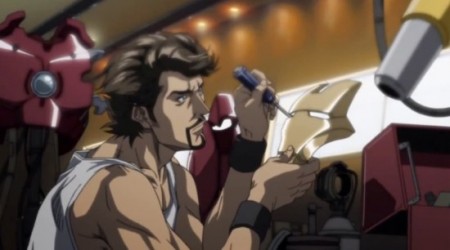Ask John: Are Japanese Mecha Otaku Buoying Iron-Man?

Question:
Does Iron Man fill a void for Japanese otaku who miss mecha-themed shows? I’ve noticed that, thanks to the Robert Downey, Jr. films, Iron Man seems to be one of the few Marvel properties crossing over into that country, to the point that they’re getting the new one before us. While it’s true that Japan still has hit home-grown mecha properties which the public can enjoy, such as Gundam and Evangelion, the new incarnations of these series are simply variations of their predecessors, and nothing really new in of themselves. So, for them, even though it’s decades old in America, Iron Man might be the first “new” mecha anything they’ve seen in ages, which is why they embrace it more than the usual Marvel characters. Or maybe Iron Man’s just another big-budget FX film which does well in Japan because its a big-budget FX film.
Answer:
I’m (sadly) not on the ground in Japan with my finger on the pulse of the country. All that I can offer is a distant observer’s perspective and an untested theory. It’s my theory that if Iron-Man does have any greater fascination for Japanese viewers than other typical American super-heroes, it’s actually the character Tony Stark that appeals to the mainstream Japanese psyche more than Iron-Man fascinates the Japanese mecha otaku. Iron-Man bears some similarity to traditional Japanese high-tech armor-clad heroes including Kamen Rider (1971), Denjin Zaborger (1974), Space Sheriff Gavan (1982), and Bio-Booster Armor Guyver (1985), all of whom have their initial inspiration partially in the terrifying-looking armor worn by feudal-era samurai. But Japanese interest in the Iron-Man franchise, just like American interest, seems to extend beyond just fascination with the powered armor. Tony Stark himself may be a character more accessible and sympathetic to the Japanese psyche than many other comparable heroes. Tony Stark is literally one with technology. The arc reactor in his chest literally keeps him alive. In effect, he has embraced practical technology to a much greater and more personal degree than any other major American super-hero. That integration with technology may make him seem subconsciously “more Japanese” than other Marvel and DC created heroes. Furthermore, Stark’s brilliance, sharp tongue, lavish lifestyle, and social mobility may make him iconic of Japanese celebrity expectations. The mopish and angst-ridden Peter Parker isn’t representative of a psychology that Japanese people self-identify with. Bruce Wayne’s reclusive, strict and angst-ridden personality likewise doesn’t parallel Japanese self-identification. Neither Clark Kent’s bumbling personality nor Superman’s assured confidence seem intimately familiar to Japanese viewers. But Tony Stark’s taste for wealth and luxuriance, his tendency to indulgent spending and self-gratification, his sense of absolute justification due to his sheer brilliance do reflect the way Japanese people imagine the way the rich and famous should behave. Tony Stark’s taste for the best, his short but concentrated attention span that focuses intently on one thing and then leaves that thing behind just as quickly and casually, depict the sort of ephemeral brilliance that Japanese people admire and strive toward reaching. The way Stark perfects celebrity and social responsibility simultaneously without reservation or feelings of guilt represent an ideal Japanese lifestyle of achieving superiority in both private and public roles.
With Hollywood becoming increasingly dependent upon foreign box office receipts to compensate for declining American rental and home video revenue, and the Asian market’s known affection for elaborate, visually dynamic Hollywood blockbusters, the Iron-Man 3 film opening in Japan and other foreign markets a week before its American release may make good financial sense. Particularly given the current availability of excellent mecha anime series Suisei no Galgantia and Kakumeiki Valvrave, combined with the seeming fact that Madhouse’s Iron-Man anime wouldn’t exist without the funding and production motivation from America’s Marvel Comics, I can’t say that I see evidence that Japan’s mecha otaku community is more interested in Iron-Man than in home-grown robot anime franchises. The popularity of the Iron-Man franchise in Japan appears to be supported much more by the acting of Robert Downey Jr., the distinctive personality characteristics of the character Tony Stark, and the Hollywood blockbuster nature of the Iron-Man film franchise than grassroots support by Japanese robot and mecha anime fan community.

